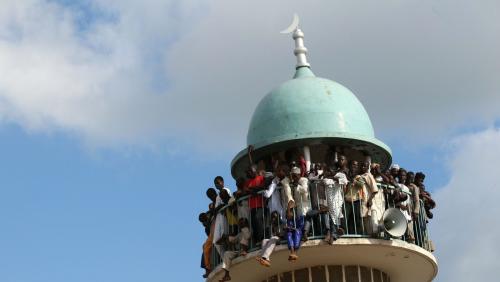
The pollution problem in many African cities goes beyond just the air quality.
Over the years, governments across the continent have attempted to tackle the noise pollution problem in major cities. In addition to the daily bustle and commercial activities, much of the noise comes from the thousands of religious places of worship that dot these cities.
In Accra, Ghana’s capital city, the government is turning to technology to hopefully serve as a panacea: local mosques have been asked to send text and WhatsApp messages as a substitute for the adhan, or the call to prayers, to Muslim members rather than loud calls made using megaphones and speakers.
It’s an enduring problem elsewhere as well. In February, Rwanda closed down about 700 churches for breaking building regulations and excessive noise pollution. In March, the government also banned mosques in the capital, Kigali, from using loudspeakers during the call to prayer.
Lagos, Africa’s largest city which is home to an estimated 20 million people, has for some years been looking to clamp down on public noise levels. Local churches and mosques have been advised to take down external speakers from worship centers and adhere to noise limits of 60 decibels during the day and 50 decibels (pdf) at night—similar to noise level stipulations in the United Kingdom’s Environment Protection Act of 1997.
In 2016, the state shut 90 places of worship for excessive noise levels. Residents in the city are also encouraged to report noise pollution incidents. But enforcement is tricky with thousands of places of worship in need of monitoring ranging from makeshift structures home to a handful of worshipers and mushroomed in dense residential areas to vast megachurches on the city outskirts with auditoriums that hold congregations of up to 200,000 people.
A balancing act
From Germany and Israel to the US and even in Muslim-majority nations like the United Arab Emirates, broadcasting religious sermons or adhan over speakers has been a contentious issue across the world. The World Health Organization has also warned of the long-term health problems of noise, including cardiovascular effects, poorer work and school performance, and hearing impairment.
Yet urging churches and mosques to desist from noise pollution has been tricky, especially among Africans who have consistently ranked religion as a “very important” component in their lives. Recent crackdowns also come as government antagonism towards religious minorities in Africa increase, according to a Pew Research study from last year.
The article continues – here.
